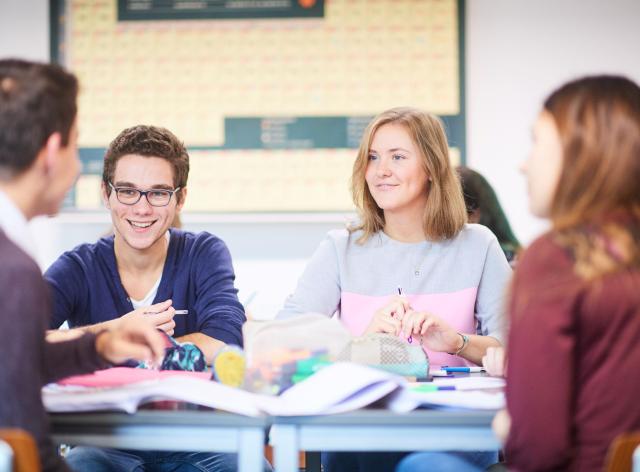Created in 1978, the Department of Psychology has carried out extensive research in various fields of the humanities and social sciences as well as health, with a particular interest in vulnerable people, neuroscience and eHealth.
The Department of Psychology mainly teaches within the Faculty of Medicine. In the human and social sciences, it has acquired a national and international reputation for conducting qualitative studies of people suffering from physical or psychological disorders. Currently, the department is building a large-scale longitudinal survey on well-being and collaborating on research into psychosocial risks at work and in companies. This research has led to the publication of 200 articles and some twenty books, as well as participation in numerous scientific and popularization conferences.
In the healthcare sector, the department has taken a particular interest in neuroscience, in particular with the development of a battery of attentional tests, commonly used clinically (BAWL, William Lennox Attention Battery). It also has a technological platform for murine animal behavior, enabling the testing of genetically modified populations and the use of research-derived molecules, and works in the field of systemic neuroscience with the use of medical imaging. Finally, the department is collaborating with a hypnotherapist psychiatrist to better understand the mechanisms involved in the functioning of hypnosis.
The department works in the field of eHealth and collaborates on research projects using mobile applications to track health and well-being.
Find out more about the Department of Psychology
Spotlight
News

Innovative methods for assessing body perception in adults with autism
Innovative methods for assessing body perception in adults with autism
Joanna Mourad, a doctoral student in the Department of Psychology at UNamur's Faculty of Medicine, has just published a study that incorporates dynamic digital tools to better assess body perception in people with autism. Explanations.

Everyone thinks they know what autism is. We imagine a cliché character like the one in the film Rain Man, a kind of genius with a host of obsessive disorders as well as communication and socialization problems. Yet Rain Man presents only one aspect of the more or less exacerbated symptoms that autistic people can have. Some can mask their symptoms and go to great lengths to adapt. When we come across them, our tendency is to describe them as "peculiar", obsessive, high-strung, bordering on genius or a little "weird".
Joanna Mourad is interested in autistic people and especially in their perception of the body, which in professional jargon is called "body representations". Originally from Lebanon, she graduated as a psychomotrician in 2018 from Saint Joseph's University in Beirut. Since 2023, she has been working on a double thesis (BOF UHasselt-UNamur) in the Department of Psychology at the Faculty of Medicine.
Body representations - Quézako?
Take a few moments to observe yourself in a mirror. What does your image reflect back to you? What's the first thing you look at? Do you see your complexes, your pride? Do you move the way you want to?
Body representations, are our unique and personal mental representations. They can be objective or subjective in relation to reality or the moment, satisfying or unsatisfying, and evolve over time according to our experiences. What is certain is that our sensory and emotional experiences have a direct impact on who we are, whether in our relationships, our behaviors, or even our moods...
With autistic people, the impact on physical and mental health is even greater. This represents a real challenge, as they live on average 10 to 20 years less than other people. They also develop more cardiovascular disease due to their almost constant state of stress. The suicide rate is also 9 times higher.
This is why it's so important to better understand how autistic people perceive their bodies. Assessment techniques already exist, but they are mostly self-report questionnaires related to body image and performance.
Prospects for multisensory evaluation
What was missing was a holistic approach that takes behavior into account continuously and in real time.
In her article "Innovative Digital Phenotyping Method to Assess Body Representations in Autistic Adults: A Perspective on Multisensor Evaluation", Joanna Mourad collects data at a given point in time and over an extended period, and analyzes it using a combination of traditional techniques and modern tools.
This innovative approach relies on techniques such as momentary ecological assessments (in real time in everyday life) and time series analyses (via connected devices such as watches or smartphones, ...), to capture dynamics and changes in their experience over time. To process the data collected, researchers use advanced statistical tools such as multivariate regression, time series analysis and artificial intelligence algorithms. These tools provide a better understanding of the multiple factors influencing body perception in people with autism.
In developing this method, the team attaches particular importance to ethics and the involvement of the people concerned, and takes into account potential challenges, such as variable technology adoption and accessibility.
This approach revolutionizes the assessment of body perception by integrating traditional and dynamic tools, while offering a more caring assessment environment adapted to people with autism.
Recent activities
On November 16, 2024, Joanna Mourad was able to present her study to over 600 people during a talk at the 2nd Occitan Psychomotricity Conference in Montpelier.
In October 2024, Joanna Mourad had taken part in the training course "Autism without intellectual disability in adults and adolescents: from clinic to practice" led by Prof. Bernadette Grosjean, one of the experts on the subject. This training course was organized at the University of Namur by the centre de formation continue "Santé mentale et psychiatrie".
"It is thanks to Bernadette Grosjean that my perception of autistic people has profoundly evolved, which has transformed the way I conduct my research in the field from a neuro-affirmative perspective. I'd also like to express my gratitude to my two promoters, Martin Desseilles and Bruno Bonnechère, who have given me so much support and guidance along the way, as well as to my co-promoter Katleen Bogaerts and my support committee", explains Joanna Mourad.
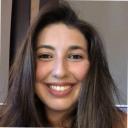
In relation to my double thesis between Flanders and Wallonia, I'm confronted with two rich and diverse worlds from which I'm learning doubly. I'm very proud of my results, which are opening up new perspectives. I think I'm really lucky!
Research and teaching in the Department of Psychology
Created in 1978, the Department of Psychology has carried out extensive research in various fields of the humanities, social sciences and health, with a particular focus on vulnerable people, neuroscience and eHealth.
In the humanities and social sciences, the Department has earned a national and international reputation for conducting qualitative studies of people suffering from physical or psychological disorders. It mainly provides courses for the Faculty of Medicine and, in the context of continuing education, for healthcare professionals, notably with the "Dual Diagnosis" Interuniversity Certificate, the next edition of which will take place from September 2025.
.BOF 2025 stock exchange call
The joint UHasselt-UNamur call for doctoral scholarships is now open, as part of the Fonds FSR, which finances doctoral scholarships.
This funding is open to candidates (without gender, nationality or age restrictions) who wish to prepare their doctorate in collaboration between UNamur and UHasselt. Deadline for applications: 03/03/2025.
Information and contact: secretariat.adre@unamur.be
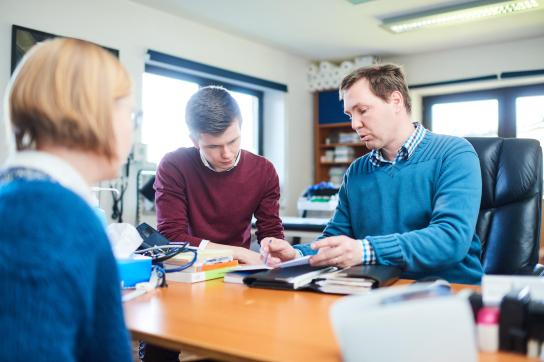
Training tomorrow's doctors: a look back at the work of ASBL PAH
Training tomorrow's doctors: a look back at the work of ASBL PAH
As part of the practical work (TP) in medical psychology at the University of Namur's Faculty of Medicine, a landmark intervention took place. A pair, comprising Dominique Damas, expert patient and active member of the ASBL PAH (Plateforme Annonce Handicap), and Dr. Latteur, physician, came to share their experience on a subject as delicate as it is essential: the announcement of bad news or serious diagnoses to patients.
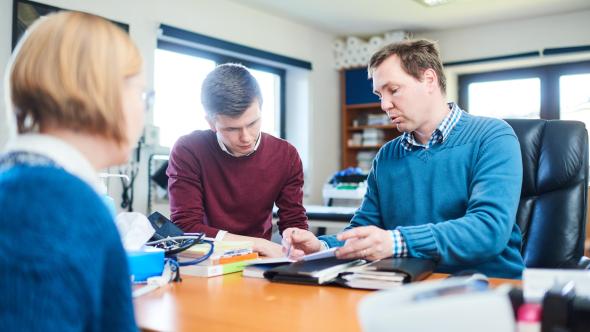
With the support of teachers Hélène Cocriamont, Laura Demarthe and Hélène Givron, these practical exercises are part of the medical psychology course run by Professor M. Desseilles. Their aim is to strengthen medical students' professional communication skills in healthcare.
Dominique Damas, mother of three children with Fragile X syndrome, gave evidence of her personal experiences of bad news announcements. Three times, she had to face the ordeal of receiving this diagnosis for her children. Through her experiences, she has developed an expertise that she now puts at the service of others. This approach has enabled her to transform a personal ordeal into a collective commitment, by joining associations dedicated to disability.
His collaboration with Dr. Latteur enabled the students to grasp the issues involved in successful caregiver-caregiver communication: active listening, choice of words, adaptation to the patient and family, post-announcement follow-up. A key point raised during the session was the importance of "taking the time", as an announcement of a serious diagnosis cannot be dispatched in 20 minutes.
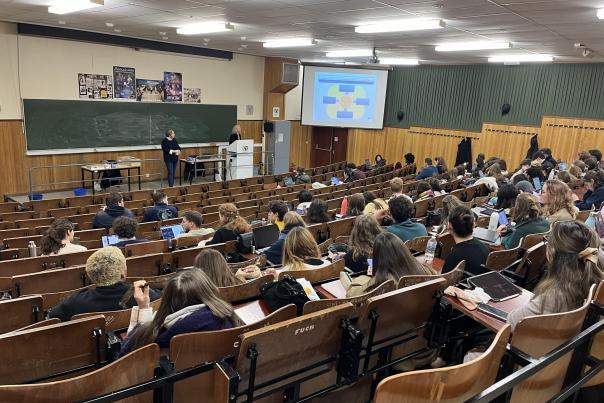
The challenges: better support for patients and their families
The intervention had several objectives:
- To prepare students to apprehend a situation as sensitive as the announcement of bad news, by providing them with practical and theoretical tools.
- To improve support for patients and their families, taking into account their emotions and understanding of the situation.
- Favoring a humane and caring approach, where the person delivering the diagnosis must remember that they have an obligation of means, not of result.
Students also received a booklet of practical advice "Accompagner l'annonce d'un diagnostic", to extend learning after the practical sessions.
The testimony of Dominique Damas and the experience of Dr. Latteur captivated the 3rd-year medical students, as one of them testified:
"It's really great to have this kind of intervention in our curriculum. What's more, the guests are so involved that it makes for an exciting time. "
These exchanges provide a 360-degree view, integrating the patient's and caregiver's perspectives. This immersive approach prepares future doctors to face these difficult situations with serenity and professionalism, while raising their awareness of their own mental health.
Mental health and well-being in medical school
At UNamur, the mental health of medical students is a priority. Several initiatives from the psychology department complement these TP:
- Practical work designed to reinforce reflection on the importance of their physical and mental well-being.
- A special focus on preventing burn-out, a pervasive problem in the medical profession.
- The creation of a mini-guide to professional communication, distributed after interactive role-playing.
- An immersive-learning system to practice breaking bad news.
These pedagogical initiatives demonstrate the Faculty of Medicine's commitment to offering an all-round training, which is not limited to technical expertise but also encompasses the inter- and intrapersonal aspects, essential to practicing medicine in all its complexity.
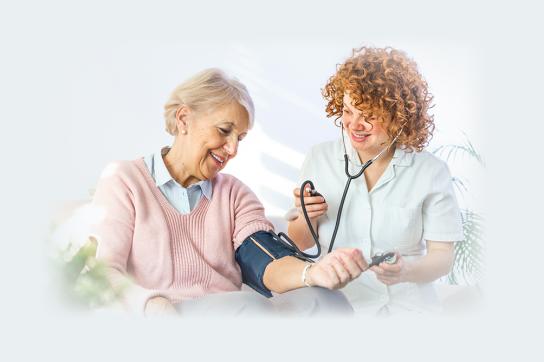
Rural medicine: the UNamur inaugurates a university observatory
Rural medicine: the UNamur inaugurates a university observatory
This is a first in the Belgian medical and academic landscape: a university observatory for rural medicine has been set up at the University of Namur. Its mission is to understand the shortage of doctors in rural areas and identify solutions, in collaboration with local stakeholders, to encourage future GPs to set up in these regions.
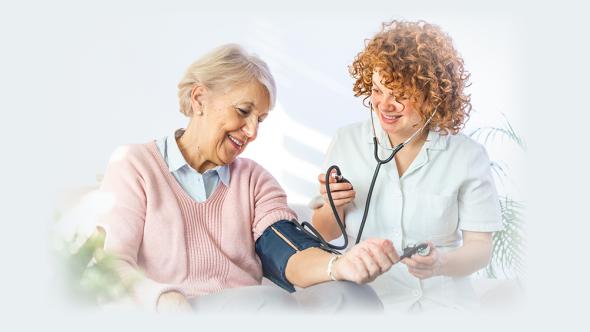
Quelles sont les principales difficultés rencontrées par les médecins généralistes dans les zones rurales ? Quels sont les freins à leur installation sur ces territoires ? Comment s’organisent les visites, les déplacements, la permanence des soins ou encore de la garde en milieu rural ? Quelles sont les nouvelles pratiques et comment sont exploitées les nouvelles technologies par les médecins généralistes ? C’est pour comprendre et répondre à une série de problématiques rencontrées par la première ligne de soins en zones rurales, que l’UNamur se dote d’un nouvel observatoire universitaire en médecine rurale.
Trois missions
Encadré par un comité de guidance multidisciplinaire composé de médecins généralistes et d’académiques dans le domaine de la pharmacie, de la psychologie et de la géographie de la santé, ce nouvel observatoire poursuivra trois missions principales :
- Comprendre les difficultés rencontrées par les médecins généralistes dans les zones rurales;
- Proposer des pistes de solution réalistes et concrètes pour améliorer la situation de la médecine en zones rurales ;
- Donner la parole aux acteurs de la médecine rurale en créant une communauté académique et de soignants.
« Comprendre les réalités de terrain avec un maximum de nuances implique aussi de donner la parole à tous les acteurs de la médecine rurale sur le terrain. Ceux-ci seront sollicités à la fois dans le cadre d’enquêtes ; mais également lors de conférences et des tables rondes organisées dans le cadre de ce projet », précise le Docteur Dominique Henrion, chargé de cours au sein de la Faculté de médecine, et médecin généraliste. L’observatoire sera donc aussi un lieu de dialogue entre l’ensemble des acteurs de la première ligne de soins (médecins, infirmières, pharmaciens…) et de formation continue pour les médecins généralistes.
Les résultats des travaux seront diffusés largement au travers de rapports et d'un mémorandum adressé à l’ensemble des acteurs, y compris politiques. Ils seront intégrés à la formation dispensée au sein du nouveau master de spécialisation en médecine générale (lire par ailleurs) qui s’ouvre à l’UNamur, en vue de préparer au mieux les futurs médecins généralistes et favoriser leur installation en zones rurales.
Une première étude : définir la médecine rurale en Belgique
Une première étude est lancée : elle porte sur la définition de la médecine rurale en Belgique, et en particulier en Wallonie et l’identification des principales zones d’intérêt. Cette recherche sera menée au département de géographie de l’UNamur, sous la supervision de Catherine Linard experte en géographie de la santé et Directrice du Département de géographie de l’UNamur.
Un déploiement en 5 ans
L’observatoire universitaire en médecine rurale propose un déploiement d’activités en 5 ans, entre 2023 et 2028 et sous réserve de financement. Lancé à l’automne 2023, il proposera une première table ronde l’automne 2024 et organisera deux conférences par an, chaque année entre 2024 et 2028. Une deuxième table ronde se tiendra en 2028.
Des rapports d’avancement seront régulièrement produits : deux rapports intermédiaires, en 2024 et en 2026 et un rapport final ainsi que le mémorandum en 2028.
Un crowdfunding pour soutenir la démarche
Pour atteindre ses ambitions, l’observatoire universitaire en médecine rurale est à la recherche de soutiens et de partenaires désireux de s’engager à ses côtés pour apporter des solutions à une question majeure de santé publique. Une campagne de crowdfunding est lancée auprès de partenaires et du grand public. 100 % des fonds récoltés seront utilisés pour mener des recherches sur les problématiques spécifiques qui affectent la médecine rurale et y apporter des solutions.
La médecine générale à l’UNamur
« La médecine générale est un enjeu crucial de santé publique, qu’il semble indispensable d’aborder dès le démarrage de la formation des jeunes médecins. C’est la raison pour laquelle l’UNamur a été la première université francophone à intégrer un stage en médecine générale, obligatoire pour l’ensemble des étudiants dès la troisième année de bachelier », souligne le professeur Jean-Michel Dogné, Doyen de la Faculté de médecine de l’UNamur.
"L’UNamur organisera un Master de spécialisation en médecine générale dès septembre 2024 en co-diplomation avec l’UClouvain et en co-organisation avec l’Université du Luxembourg"
Les études en médecine à l'UNamur
La médecine générale vous intéresse ? Découvrez toutes les informations sur ce master qui sera proposé dès septembre 2024.
Le projet en images

DJESA: awareness-raising and interdisciplinarity in medical education
DJESA: awareness-raising and interdisciplinarity in medical education
On Friday, March 1, the Faculty of Medicine hosted a Half Day of Exchange on Food Sovereignty (DJESA), organized by the UNI4COOP consortium, Humundi and Vétérinaires Sans Frontières. Led by Professor Grégoire Wiëers, Director of UNamur's Department of Medicine, and Caroline Canon, Master of Didactics, this event was dedicated to Block 2 students in medicine, pharmacy and biomedical sciences. An afternoon punctuated by a gesticulated lecture by Corentin Hecquet and awareness-raising workshops on sustainable development and interdisciplinarity in the medical field.
.
For its second edition, the DJESA project was hosted by the University of Namur for students in the Faculty of Medicine. An opportunity to raise their awareness of food sovereignty and the issues involved. But what does food sovereignty really mean? This concept encompasses the right of peoples to healthy and adequate food, thus ensuring their food security. According to Caroline Canon, Master of Didactics at UNamur's Faculty of Medicine, "it is essential to integrate sustainable development objectives into teaching programs so that future professionals are aware of environmental and societal issues, and can act as informed academic citizens. "
Parallel to this, FUCID (Forum Universitaire pour la Coopération Internationale au Développement), an NGO on the Namur campus, wants to roll out DJESA in various faculties. Raising awareness of current issues, such as food sovereignty, is crucial if we are to envisage alternative models for tomorrow, and to do so in an interdisciplinary way. Maxime Giegas, Project Manager at FUCID, emphasizes: "With medical students, we can establish many links between their curriculum and the topics addressed during DJESA. This initiative confronts them with issues they don't encounter on a daily basis, which enriches their learning. "
What is DJESA?
Demi-journée d'Échange sur la Souveraineté Alimentaire, organized by the Uni4Coop consortium (Eclosio, FUCID, Louvain Coopération, ULB-Coopération), Humundi and Vétérinaires Sans Frontières. Aimed at the various French-speaking campuses in Belgium, the DJESA project features a conference on food sovereignty, followed by various workshops on the topic.
The inaugural conference, moderated by Corentin Hecquet, a sociology graduate from the Université catholique de Louvain and PhD in environmental sciences, highlighted the urgency of promoting food sovereignty in a changing world and explored the close links between food, health and the environment. Students had the opportunity to deepen their understanding of agricultural policies, sustainable food practices and their impact on public health. "During my lecture, I try to address interdisciplinary openness to other types of knowledge, such as that of patients, as well as critical thinking," shares Corentin Hecquet. More than just an academic discussion, the meeting aimed to stimulate active reflection on the role of healthcare professionals in promoting fair and ecologically responsible food systems.
Then, workshops linked to the theme enabled students to think about the issues pro-actively. The organization of DJESA called for interdisciplinarity - various disciplines must collaborate to achieve food justice and thus, the sustainability of life. In this sense, the conference also opens the discussion for medical students to the "One Health" philosophy, which aims to foster interaction between different disciplines to achieve recognition of the interconnectedness of living things, of "one health". The professors want to integrate this philosophy into the medical curriculum, promoting harmony between interdisciplinarity and sustainable development. "We want to make students aware of the important role they are going to have to play. This philosophy requires interdisciplinarity, respect and acceptance of the fact that no single solution exists. We're going to have to move forward, admittedly with our limitations, but not back down from the problem and collaborate", supports Caroline Canon.
It would appear that the objective has been achieved, with many students having been made aware, sharing positive opinions. "I find it very interesting to broach this subject in our curriculum because some students will go into this field. Confronting them with these issues now will prepare them for the future", relates Livia Saccon, a biomedical sciences student. "This conference taught me a lot about subjects I didn't know," rejoices Alexandra Priso, pharmacy student.
In conclusion, DJESA was an opportunity for students in the fields of life sciences, health and disease, to broaden their horizons and become aware of the crucial importance of food sovereignty in the current context. This interdisciplinary initiative encourages critical thinking and prepares future healthcare professionals to play a key role in a fair and ecologically responsible manner.
UNamur sustainable in form and substance
The university has a duty to set an example in terms of sustainable development, in all three of its dimensions (economic, social and environmental). Notably through the way it manages its infrastructures and assets for a "sustainable campus in form", as well as, as a teaching and research institution, through its commitment to actively contribute to the environmental transition "sustainable campus in substance". Indeed, this is one of the objectives of the Univers2025 strategic plan. All in line with the United Nations' Sustainable Development Goals (SDGs).

Innovative methods for assessing body perception in adults with autism
Innovative methods for assessing body perception in adults with autism
Joanna Mourad, a doctoral student in the Department of Psychology at UNamur's Faculty of Medicine, has just published a study that incorporates dynamic digital tools to better assess body perception in people with autism. Explanations.

Everyone thinks they know what autism is. We imagine a cliché character like the one in the film Rain Man, a kind of genius with a host of obsessive disorders as well as communication and socialization problems. Yet Rain Man presents only one aspect of the more or less exacerbated symptoms that autistic people can have. Some can mask their symptoms and go to great lengths to adapt. When we come across them, our tendency is to describe them as "peculiar", obsessive, high-strung, bordering on genius or a little "weird".
Joanna Mourad is interested in autistic people and especially in their perception of the body, which in professional jargon is called "body representations". Originally from Lebanon, she graduated as a psychomotrician in 2018 from Saint Joseph's University in Beirut. Since 2023, she has been working on a double thesis (BOF UHasselt-UNamur) in the Department of Psychology at the Faculty of Medicine.
Body representations - Quézako?
Take a few moments to observe yourself in a mirror. What does your image reflect back to you? What's the first thing you look at? Do you see your complexes, your pride? Do you move the way you want to?
Body representations, are our unique and personal mental representations. They can be objective or subjective in relation to reality or the moment, satisfying or unsatisfying, and evolve over time according to our experiences. What is certain is that our sensory and emotional experiences have a direct impact on who we are, whether in our relationships, our behaviors, or even our moods...
With autistic people, the impact on physical and mental health is even greater. This represents a real challenge, as they live on average 10 to 20 years less than other people. They also develop more cardiovascular disease due to their almost constant state of stress. The suicide rate is also 9 times higher.
This is why it's so important to better understand how autistic people perceive their bodies. Assessment techniques already exist, but they are mostly self-report questionnaires related to body image and performance.
Prospects for multisensory evaluation
What was missing was a holistic approach that takes behavior into account continuously and in real time.
In her article "Innovative Digital Phenotyping Method to Assess Body Representations in Autistic Adults: A Perspective on Multisensor Evaluation", Joanna Mourad collects data at a given point in time and over an extended period, and analyzes it using a combination of traditional techniques and modern tools.
This innovative approach relies on techniques such as momentary ecological assessments (in real time in everyday life) and time series analyses (via connected devices such as watches or smartphones, ...), to capture dynamics and changes in their experience over time. To process the data collected, researchers use advanced statistical tools such as multivariate regression, time series analysis and artificial intelligence algorithms. These tools provide a better understanding of the multiple factors influencing body perception in people with autism.
In developing this method, the team attaches particular importance to ethics and the involvement of the people concerned, and takes into account potential challenges, such as variable technology adoption and accessibility.
This approach revolutionizes the assessment of body perception by integrating traditional and dynamic tools, while offering a more caring assessment environment adapted to people with autism.
Recent activities
On November 16, 2024, Joanna Mourad was able to present her study to over 600 people during a talk at the 2nd Occitan Psychomotricity Conference in Montpelier.
In October 2024, Joanna Mourad had taken part in the training course "Autism without intellectual disability in adults and adolescents: from clinic to practice" led by Prof. Bernadette Grosjean, one of the experts on the subject. This training course was organized at the University of Namur by the centre de formation continue "Santé mentale et psychiatrie".
"It is thanks to Bernadette Grosjean that my perception of autistic people has profoundly evolved, which has transformed the way I conduct my research in the field from a neuro-affirmative perspective. I'd also like to express my gratitude to my two promoters, Martin Desseilles and Bruno Bonnechère, who have given me so much support and guidance along the way, as well as to my co-promoter Katleen Bogaerts and my support committee", explains Joanna Mourad.

In relation to my double thesis between Flanders and Wallonia, I'm confronted with two rich and diverse worlds from which I'm learning doubly. I'm very proud of my results, which are opening up new perspectives. I think I'm really lucky!
Research and teaching in the Department of Psychology
Created in 1978, the Department of Psychology has carried out extensive research in various fields of the humanities, social sciences and health, with a particular focus on vulnerable people, neuroscience and eHealth.
In the humanities and social sciences, the Department has earned a national and international reputation for conducting qualitative studies of people suffering from physical or psychological disorders. It mainly provides courses for the Faculty of Medicine and, in the context of continuing education, for healthcare professionals, notably with the "Dual Diagnosis" Interuniversity Certificate, the next edition of which will take place from September 2025.
.BOF 2025 stock exchange call
The joint UHasselt-UNamur call for doctoral scholarships is now open, as part of the Fonds FSR, which finances doctoral scholarships.
This funding is open to candidates (without gender, nationality or age restrictions) who wish to prepare their doctorate in collaboration between UNamur and UHasselt. Deadline for applications: 03/03/2025.
Information and contact: secretariat.adre@unamur.be

Training tomorrow's doctors: a look back at the work of ASBL PAH
Training tomorrow's doctors: a look back at the work of ASBL PAH
As part of the practical work (TP) in medical psychology at the University of Namur's Faculty of Medicine, a landmark intervention took place. A pair, comprising Dominique Damas, expert patient and active member of the ASBL PAH (Plateforme Annonce Handicap), and Dr. Latteur, physician, came to share their experience on a subject as delicate as it is essential: the announcement of bad news or serious diagnoses to patients.

With the support of teachers Hélène Cocriamont, Laura Demarthe and Hélène Givron, these practical exercises are part of the medical psychology course run by Professor M. Desseilles. Their aim is to strengthen medical students' professional communication skills in healthcare.
Dominique Damas, mother of three children with Fragile X syndrome, gave evidence of her personal experiences of bad news announcements. Three times, she had to face the ordeal of receiving this diagnosis for her children. Through her experiences, she has developed an expertise that she now puts at the service of others. This approach has enabled her to transform a personal ordeal into a collective commitment, by joining associations dedicated to disability.
His collaboration with Dr. Latteur enabled the students to grasp the issues involved in successful caregiver-caregiver communication: active listening, choice of words, adaptation to the patient and family, post-announcement follow-up. A key point raised during the session was the importance of "taking the time", as an announcement of a serious diagnosis cannot be dispatched in 20 minutes.

The challenges: better support for patients and their families
The intervention had several objectives:
- To prepare students to apprehend a situation as sensitive as the announcement of bad news, by providing them with practical and theoretical tools.
- To improve support for patients and their families, taking into account their emotions and understanding of the situation.
- Favoring a humane and caring approach, where the person delivering the diagnosis must remember that they have an obligation of means, not of result.
Students also received a booklet of practical advice "Accompagner l'annonce d'un diagnostic", to extend learning after the practical sessions.
The testimony of Dominique Damas and the experience of Dr. Latteur captivated the 3rd-year medical students, as one of them testified:
"It's really great to have this kind of intervention in our curriculum. What's more, the guests are so involved that it makes for an exciting time. "
These exchanges provide a 360-degree view, integrating the patient's and caregiver's perspectives. This immersive approach prepares future doctors to face these difficult situations with serenity and professionalism, while raising their awareness of their own mental health.
Mental health and well-being in medical school
At UNamur, the mental health of medical students is a priority. Several initiatives from the psychology department complement these TP:
- Practical work designed to reinforce reflection on the importance of their physical and mental well-being.
- A special focus on preventing burn-out, a pervasive problem in the medical profession.
- The creation of a mini-guide to professional communication, distributed after interactive role-playing.
- An immersive-learning system to practice breaking bad news.
These pedagogical initiatives demonstrate the Faculty of Medicine's commitment to offering an all-round training, which is not limited to technical expertise but also encompasses the inter- and intrapersonal aspects, essential to practicing medicine in all its complexity.

Rural medicine: the UNamur inaugurates a university observatory
Rural medicine: the UNamur inaugurates a university observatory
This is a first in the Belgian medical and academic landscape: a university observatory for rural medicine has been set up at the University of Namur. Its mission is to understand the shortage of doctors in rural areas and identify solutions, in collaboration with local stakeholders, to encourage future GPs to set up in these regions.

Quelles sont les principales difficultés rencontrées par les médecins généralistes dans les zones rurales ? Quels sont les freins à leur installation sur ces territoires ? Comment s’organisent les visites, les déplacements, la permanence des soins ou encore de la garde en milieu rural ? Quelles sont les nouvelles pratiques et comment sont exploitées les nouvelles technologies par les médecins généralistes ? C’est pour comprendre et répondre à une série de problématiques rencontrées par la première ligne de soins en zones rurales, que l’UNamur se dote d’un nouvel observatoire universitaire en médecine rurale.
Trois missions
Encadré par un comité de guidance multidisciplinaire composé de médecins généralistes et d’académiques dans le domaine de la pharmacie, de la psychologie et de la géographie de la santé, ce nouvel observatoire poursuivra trois missions principales :
- Comprendre les difficultés rencontrées par les médecins généralistes dans les zones rurales;
- Proposer des pistes de solution réalistes et concrètes pour améliorer la situation de la médecine en zones rurales ;
- Donner la parole aux acteurs de la médecine rurale en créant une communauté académique et de soignants.
« Comprendre les réalités de terrain avec un maximum de nuances implique aussi de donner la parole à tous les acteurs de la médecine rurale sur le terrain. Ceux-ci seront sollicités à la fois dans le cadre d’enquêtes ; mais également lors de conférences et des tables rondes organisées dans le cadre de ce projet », précise le Docteur Dominique Henrion, chargé de cours au sein de la Faculté de médecine, et médecin généraliste. L’observatoire sera donc aussi un lieu de dialogue entre l’ensemble des acteurs de la première ligne de soins (médecins, infirmières, pharmaciens…) et de formation continue pour les médecins généralistes.
Les résultats des travaux seront diffusés largement au travers de rapports et d'un mémorandum adressé à l’ensemble des acteurs, y compris politiques. Ils seront intégrés à la formation dispensée au sein du nouveau master de spécialisation en médecine générale (lire par ailleurs) qui s’ouvre à l’UNamur, en vue de préparer au mieux les futurs médecins généralistes et favoriser leur installation en zones rurales.
Une première étude : définir la médecine rurale en Belgique
Une première étude est lancée : elle porte sur la définition de la médecine rurale en Belgique, et en particulier en Wallonie et l’identification des principales zones d’intérêt. Cette recherche sera menée au département de géographie de l’UNamur, sous la supervision de Catherine Linard experte en géographie de la santé et Directrice du Département de géographie de l’UNamur.
Un déploiement en 5 ans
L’observatoire universitaire en médecine rurale propose un déploiement d’activités en 5 ans, entre 2023 et 2028 et sous réserve de financement. Lancé à l’automne 2023, il proposera une première table ronde l’automne 2024 et organisera deux conférences par an, chaque année entre 2024 et 2028. Une deuxième table ronde se tiendra en 2028.
Des rapports d’avancement seront régulièrement produits : deux rapports intermédiaires, en 2024 et en 2026 et un rapport final ainsi que le mémorandum en 2028.
Un crowdfunding pour soutenir la démarche
Pour atteindre ses ambitions, l’observatoire universitaire en médecine rurale est à la recherche de soutiens et de partenaires désireux de s’engager à ses côtés pour apporter des solutions à une question majeure de santé publique. Une campagne de crowdfunding est lancée auprès de partenaires et du grand public. 100 % des fonds récoltés seront utilisés pour mener des recherches sur les problématiques spécifiques qui affectent la médecine rurale et y apporter des solutions.
La médecine générale à l’UNamur
« La médecine générale est un enjeu crucial de santé publique, qu’il semble indispensable d’aborder dès le démarrage de la formation des jeunes médecins. C’est la raison pour laquelle l’UNamur a été la première université francophone à intégrer un stage en médecine générale, obligatoire pour l’ensemble des étudiants dès la troisième année de bachelier », souligne le professeur Jean-Michel Dogné, Doyen de la Faculté de médecine de l’UNamur.
"L’UNamur organisera un Master de spécialisation en médecine générale dès septembre 2024 en co-diplomation avec l’UClouvain et en co-organisation avec l’Université du Luxembourg"
Les études en médecine à l'UNamur
La médecine générale vous intéresse ? Découvrez toutes les informations sur ce master qui sera proposé dès septembre 2024.
Le projet en images

DJESA: awareness-raising and interdisciplinarity in medical education
DJESA: awareness-raising and interdisciplinarity in medical education
On Friday, March 1, the Faculty of Medicine hosted a Half Day of Exchange on Food Sovereignty (DJESA), organized by the UNI4COOP consortium, Humundi and Vétérinaires Sans Frontières. Led by Professor Grégoire Wiëers, Director of UNamur's Department of Medicine, and Caroline Canon, Master of Didactics, this event was dedicated to Block 2 students in medicine, pharmacy and biomedical sciences. An afternoon punctuated by a gesticulated lecture by Corentin Hecquet and awareness-raising workshops on sustainable development and interdisciplinarity in the medical field.
.
For its second edition, the DJESA project was hosted by the University of Namur for students in the Faculty of Medicine. An opportunity to raise their awareness of food sovereignty and the issues involved. But what does food sovereignty really mean? This concept encompasses the right of peoples to healthy and adequate food, thus ensuring their food security. According to Caroline Canon, Master of Didactics at UNamur's Faculty of Medicine, "it is essential to integrate sustainable development objectives into teaching programs so that future professionals are aware of environmental and societal issues, and can act as informed academic citizens. "
Parallel to this, FUCID (Forum Universitaire pour la Coopération Internationale au Développement), an NGO on the Namur campus, wants to roll out DJESA in various faculties. Raising awareness of current issues, such as food sovereignty, is crucial if we are to envisage alternative models for tomorrow, and to do so in an interdisciplinary way. Maxime Giegas, Project Manager at FUCID, emphasizes: "With medical students, we can establish many links between their curriculum and the topics addressed during DJESA. This initiative confronts them with issues they don't encounter on a daily basis, which enriches their learning. "
What is DJESA?
Demi-journée d'Échange sur la Souveraineté Alimentaire, organized by the Uni4Coop consortium (Eclosio, FUCID, Louvain Coopération, ULB-Coopération), Humundi and Vétérinaires Sans Frontières. Aimed at the various French-speaking campuses in Belgium, the DJESA project features a conference on food sovereignty, followed by various workshops on the topic.
The inaugural conference, moderated by Corentin Hecquet, a sociology graduate from the Université catholique de Louvain and PhD in environmental sciences, highlighted the urgency of promoting food sovereignty in a changing world and explored the close links between food, health and the environment. Students had the opportunity to deepen their understanding of agricultural policies, sustainable food practices and their impact on public health. "During my lecture, I try to address interdisciplinary openness to other types of knowledge, such as that of patients, as well as critical thinking," shares Corentin Hecquet. More than just an academic discussion, the meeting aimed to stimulate active reflection on the role of healthcare professionals in promoting fair and ecologically responsible food systems.
Then, workshops linked to the theme enabled students to think about the issues pro-actively. The organization of DJESA called for interdisciplinarity - various disciplines must collaborate to achieve food justice and thus, the sustainability of life. In this sense, the conference also opens the discussion for medical students to the "One Health" philosophy, which aims to foster interaction between different disciplines to achieve recognition of the interconnectedness of living things, of "one health". The professors want to integrate this philosophy into the medical curriculum, promoting harmony between interdisciplinarity and sustainable development. "We want to make students aware of the important role they are going to have to play. This philosophy requires interdisciplinarity, respect and acceptance of the fact that no single solution exists. We're going to have to move forward, admittedly with our limitations, but not back down from the problem and collaborate", supports Caroline Canon.
It would appear that the objective has been achieved, with many students having been made aware, sharing positive opinions. "I find it very interesting to broach this subject in our curriculum because some students will go into this field. Confronting them with these issues now will prepare them for the future", relates Livia Saccon, a biomedical sciences student. "This conference taught me a lot about subjects I didn't know," rejoices Alexandra Priso, pharmacy student.
In conclusion, DJESA was an opportunity for students in the fields of life sciences, health and disease, to broaden their horizons and become aware of the crucial importance of food sovereignty in the current context. This interdisciplinary initiative encourages critical thinking and prepares future healthcare professionals to play a key role in a fair and ecologically responsible manner.
UNamur sustainable in form and substance
The university has a duty to set an example in terms of sustainable development, in all three of its dimensions (economic, social and environmental). Notably through the way it manages its infrastructures and assets for a "sustainable campus in form", as well as, as a teaching and research institution, through its commitment to actively contribute to the environmental transition "sustainable campus in substance". Indeed, this is one of the objectives of the Univers2025 strategic plan. All in line with the United Nations' Sustainable Development Goals (SDGs).


